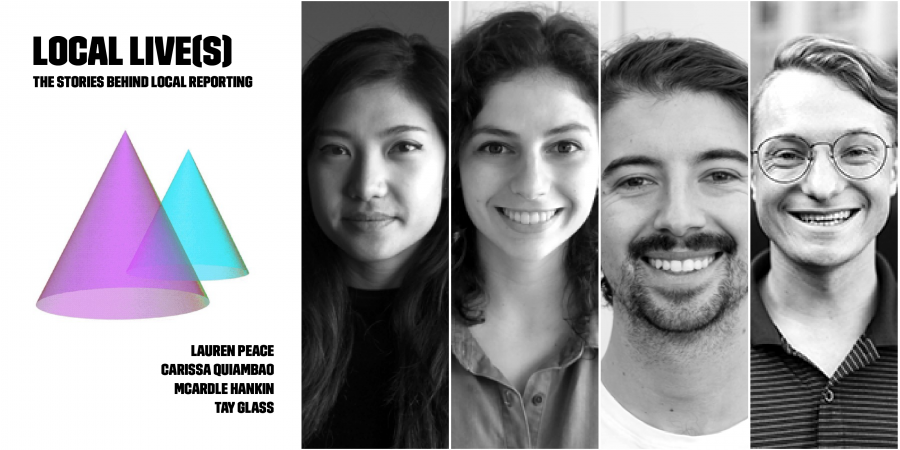Our 2020-21 Magic Grant Local Live(s) organizes and hosts live events – virtually for now – with journalists telling the stories behind their reporting. Through these events, the bi-coastal team seeks to create a dialogue between reporters in local news organizations and the communities they serve. Ultimately, the Local Live(s) project wants to establish a rapport between journalists and community members, and in the process, restore trust in local news.
This post is part of a series of interviews with our current 2020-21 Magic Grants. Since we are back in Magic Grant application season we want to showcase some of the great work our current grantees are doing and encourage you to consider applying for a Magic Grant. Here’s the link to the call for proposals, and to our FAQ. And here’s the link to the application itself – applications are due May 1.
Here’s a (lightly) edited version of the interview.
What was the main impetus for your project? Where did the idea come from?
We (McArdle and Ellison) had produced live multimedia storytelling events with Back Pocket for over three years prior and when the pandemic hit we were immediately shut down. While we knew virtual events would have a completely different character to in-person shows we also saw it as an opportunity to refine the theme of our show to showcase the human side of journalists. McArdle had just finished a masters of journalism at Stanford and was motivated to make this change to help improve trust and audience engagement in local papers.
How many events have you hosted so far? How many people have attended?
We’re halfway through our first season. We’ve hosted six events with five different newsrooms. Our audiences average about 130 people per show, although the numbers seem to be increasing event after event. Our seventh event with WFAE, North Carolina’s NPR station is this Thursday, March 25th at 7pm!
What’s special about your events? How are they different?
Aside from being a ton of fun, our events provide a unique bonding experience, where locals can get to know the journalists that represent their community in this really intimate way. Storytelling is one of the world’s oldest art forms, but it’s still new for a lot of people. Our shows help audience members better understand how the news is made. It also allows newsrooms to engage with their audience in a new and different way.
What have been some of the highlights?
When an audience member was so moved by a reporter’s story that they became a supporting member of the newsroom midevent!
Another is the fact that our partner newsrooms seem really excited and encouraged by our events so far. Some of them are planning to use our model to continue producing events after our initial partnership ends. They see Local Live(s) not only as a way to connect with their community, but also extend the longevity and profitability of their news stories.
How has the audience responded? And what about news organizations?
Audience response has been really encouraging so far: ~91% of attendees stay for the entire 1-hour long event.
Also, our shows provide another revenue making opportunity for our partner newsrooms.
Can you give us a brief description of the range and breadth of the people you’ve worked with and the topics they have presented on?
Our Chicago show featured Evan F. Moore a culture reporter who told the story of Drill music, a hip-hop subgenre that is often used as a scapegoat for violence in black communities in Chicago. Evan talked about the reality of the violence in the music but also about his need as a reporter to address the deeper systemic issues (housing, policing, jobs) that are hamstringing the black community that he reports on and lives in.
Our Tampa show featured Pulitzer-Prize Winner Leonora LePeter Anton who told the behind-the-scenes story of her reporting about DNA testing and a man on Death Row.
What comes next?
We’re hoping to produce a second, expanded season of events to scale them to an even larger crowd and hopefully produce in-person shows.
One consistent theme we have heard from editors and journalists is that there is an opportunity to use the content from our shows to produce a podcast adaptation of our live shows. We are very excited about this possibility and think that it will help us build journalistic trust in an even wider audience.

